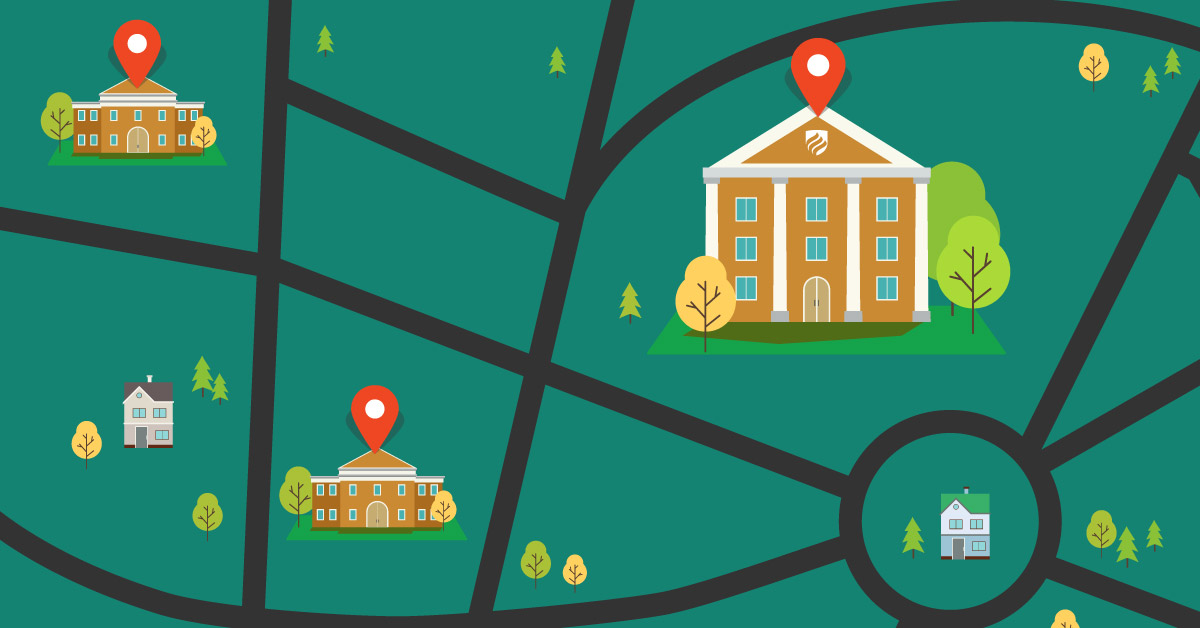Popular Searches
Here’s the problem with “best”: It is a very subjective word. The best school for one person is the square-peg-in-a-round-hole mismatch for another person.
To truly find your best educational fit, start with an assessment of your academic—and social, extracurricular and financial—wants and needs. Out of the more than 4,700 two- and four-year colleges in the United States, you are sure to find one (or several) that suits you.
Five Topics to Consider When Looking For “Colleges Near Me”
1. Location
How close to home do you want to be? Close enough to commute? To come home for weekend visits, or just for breaks? If you widen your geographic boundaries, you will open up more opportunities.
Do you feel more comfortable in a rural setting, where the town revolves around the college calendar? Or do you want a suburban environment? Or the bustle of city living? Also consider the size of the campus itself. A smaller school may feel more intimate and individualized, but a larger one could offer more diversity and extracurricular experiences.
2. Academics
If you are certain of what you want to study, you can zero in on schools that offer compatible programs. But take care, because the vast majority of college students switch their majors at least once. Liberal arts colleges offer some latitude for undecided majors if you change your mind midstream.

Students go in thinking they want a certain major and it can be very difficult to switch to a new one if you’re not at a liberal arts college. At a liberal arts institution, you don’t have to decide right away, and that’s OK.
—Morgan Ryba, associate director of first-year admission at Elmhurst University
3. Culture
Just like people, colleges have different personalities. Some are more traditional, while others pride themselves on innovation. Many have religious foundations; others are decidedly secular. Sports can be the big draw on certain campuses. Or the arts. Or research. Or activism.
4. Finances
It may seem like this should be factored in first. But it can be helpful to set finances aside initially. No one wants to graduate buried in debt, but sticker prices can be deceiving—so don’t exclude a school based on price alone. Colleges that seem too expensive at first can become affordable when aid packages are factored in.
5. Career Opportunities
Where do you want to live and work once you graduate? What off-campus opportunities exist to build your career network? Graduates often live around or near their alma mater, meaning the impact of a school’s location can last longer than the roughly four years you attend it.
Choosing the Best “Colleges Near Me”
Once you have a better idea of what you want, start weighing your options. Feeling overwhelmed or confused isn’t unusual during the college selection process, so remember these three resources to help guide you through.
1. School Counselors, Admission Officers and Employers
They make it their business to know the ins and outs of higher education. If you are in high school, a visit to your guidance department is a great place to start. Calling the admission offices of schools you’re interested in can help you nail down all the questions you want answered.
“Use our experience as a resource,” Ryan said. “We have ‘counselor’ in our title for a reason. We try to steer students in the right direction, even if it’s not the college where we work, because we really do want what’s best for them.”
And for those who are already in the workforce, employers can clue you in to schools they may have partnerships with or that cater to folks in your profession.
2. Parents, Friends and Family
Your tribe knows you best and may point out attributes that you haven’t yet considered. Ask them what they liked about their own college choices and what they wish they had done differently.
3. In-Person and Online Visits
Campus tours let you see firsthand what a school is all about. If that’s not possible, do some internet searches and poke around on schools’ homepages. College search apps and websites, such as College Data and the Common App, let you explore by criteria such as geographic area, student body size, acceptance and graduation rates, and cost.
There is no one best college for everyone, but rest assured there is a best place—where you can thrive academically and socially, where you are comfortable being who you are but are also challenged to grow.
Want to Learn More About Elmhurst University?
Complete our form to request more information!
Sources
- https://bigfuture.collegeboard.org/
- https://www.collegexpress.com/articles-and-advice/admission/articles/find-college/finding-right-college-match/
- https://www.usnews.com/education/blogs/professors-guide/2009/12/30/10-tips-for-starting-your-college-search
- https://www.collegedata.com/cs/search/college/college_search_tmpl.jhtml
- https://www.commonapp.org/explore-colleges
Posted February 15, 2019



